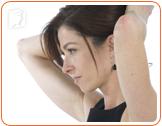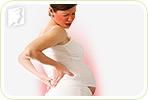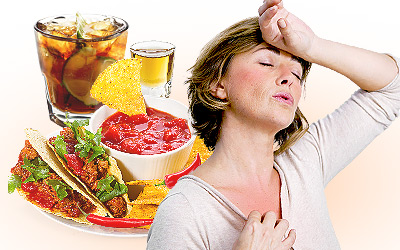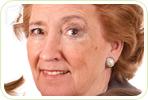Hot flashes are a common symptom of menopause. They are defined as episodes of sudden and intense heat that can affect the head and neck area. The experience can leave you feeling flustered, anxious, and stressed.
Hot flashes are caused by hormones fluctuations during the menopausal years as the body makes the transition from fertility to infertility. Although the fundamental cause of hot flashes is hormonal changes that take place during this time, there are a number of triggers that can provoke hot flashes.
Cardiovascular Exercise

Exercise, particularly high impact exercise, can trigger menopausal hot flashes. However, avoiding exercise is not the only answer. The way to avoid hot flashes and keep exercising is to stay constantly hydrated. Have some cold water and a damp towel with you, and use regularly to avoid encouraging a heated outburst. Drinking plenty of water will mean that you keep yourself hydrated despite sweating and therefore reducing the chance of a hot flash.
Crowds and Cramped Places

Crowds and cramped places are prime triggers for hot flash attacks. Lots of people in a small cramped space can increase sensations of heat and a sense of being flustered and bothered. The simplest solution is to bear your hot flashes in mind when you are thinking about where you are going. Wait for the next elevator if it looks full and avoid cramped public spaces at peak times. This way, you will reduce your chances of encountering hot flashes in public.
Cooking and Hot Foods

Being in the kitchen surrounded by steaming pots, a high-degree oven and sizzling frying pans is sure to exacerbate hot flashes. Furthermore, spicy foods and hot drinks are to be avoided at all costs because they can often worsen menopausal hot flashes. Opt for cold foods such as salad, carrot sticks and dips, and cook with the window open, and with a fan close to hand. In this way, you will avoid hot flashes provoked by external heat.
Hot flashes can be a tricky symptom to deal with, and unfortunately they are common during the menopause years. These tips will help you avoid the triggers of hot flashes, but more permanent treatment may be needed to treat the hormonal causes of hot flashes. For more information on causes, triggers and treatments for hot flashes, click on the following link.
Sources
- Sikon, Andrea and Holly Thacker M.D. "Treatment for Menopausal Hot Flashes". Cleveland Clinic Journal of Medicine. July 2004: 71 (7).
- "Hot flashes ... in January". Canadian Medical Association Journal. 2004: 170 (1).
- Miller, Heather and Rose Maria Li, M.D. "Measuring Hot Flashes: Summary of a National Institutes of Health Workshop". Conference report. Mayo Clinic. June 2004: 79.



